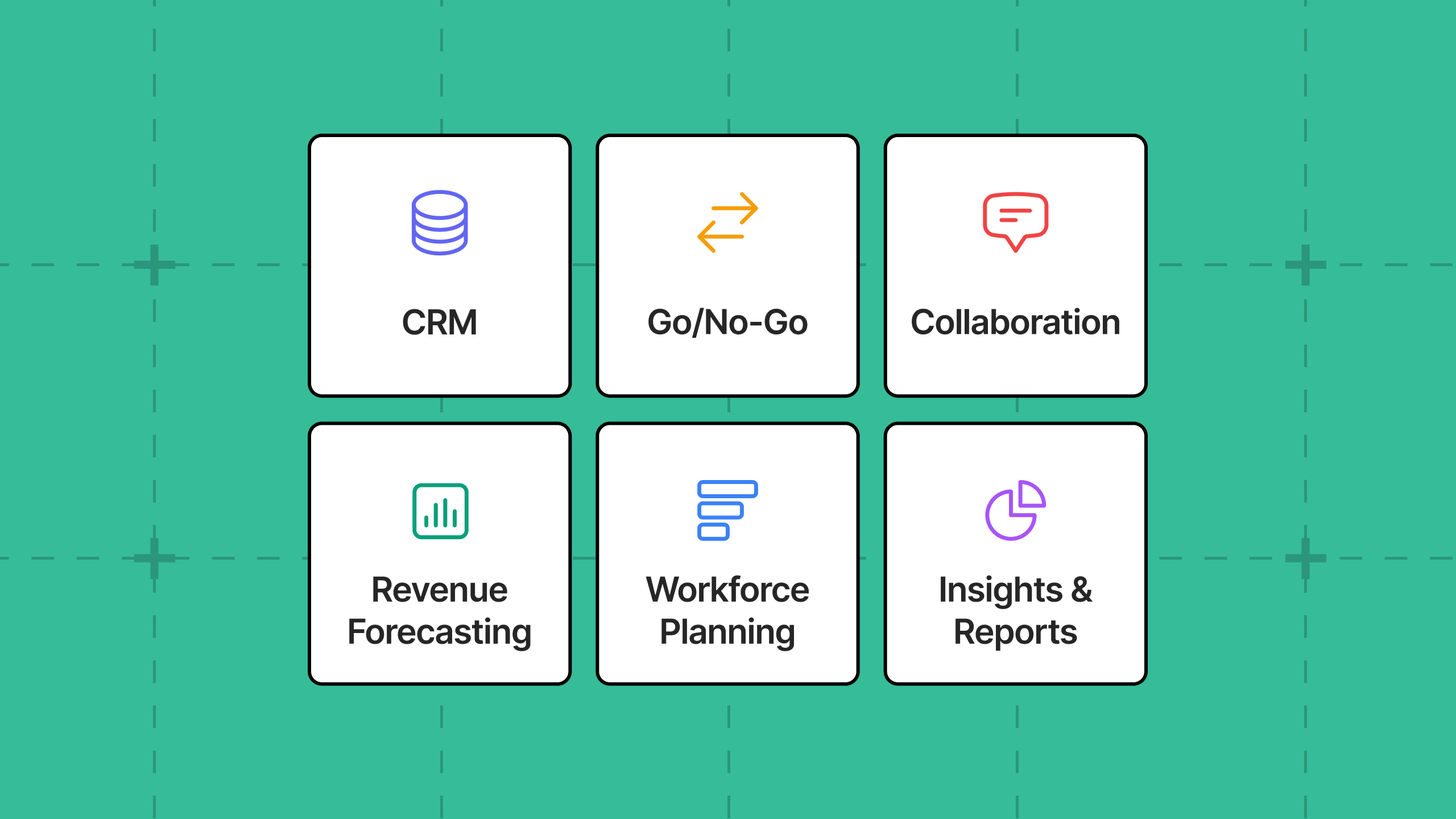
Construction CRM: The Comprehensive Guide
What CRM is, why it’s vital for construction, and how using CRM effectively is guaranteed to help your business
August 3, 2023
10 min read
Learnables

Edward Gonzalez
Founder at Buildr

What is CRM?
CRM stands for customer relationship management and generally refers to a software platform that allows companies to manage their clients at scale.
"At scale" speaks to a systematized, relational process of continued rapport that makes each individual client feel uniquely cared for, no matter how many clients that organization takes on.
Automations to an organization's customer relationship process can help maintain the illusion that the customer is the only customer. You'll notice that when "good customer service" is praised, it's usually speaking to the singular, above-and-beyond attention that the customer has felt that they received. It would be impossible for an organization to make every customer feel uniquely cared for without a deliberate overarching process that includes some level of automation.
Whether an organization adopts CRM software or not, the CRM process—technology aside—is the relational system that every organization under the sun participates in. In every industry—but especially construction—the ongoing relationship between organization and client is symbiotic with that organization's longterm success.
CRM software is beneficial in that it:
Empowers organizations to interact with their customers at scale,
Acts as a single source of truth for historical lead and customer data,
Provides invaluable customer analytics for future business decision-making,
Automates tasks and reminders,
Breaks down silos between departments, and
Forecasts future business pipeline
In short, a CRM dramatically streamlines the relational workflow of a company so that its people can better manage its time and focus elsewhere.
With CRM software aiding customer retention and customer growth, the third and arguably most powerful benefit of CRM software is customer and pipeline analytics. By compiling and examining current and prospective customer data, a worthwhile CRM software not only helps a business accurately define the attributes of their ideal customer profile, it forecasts a future business outlook in a clear and measurable way.
A business development department instilled with the education of analytics is a major reason why your company will adopt a CRM if it hasn’t already. We're beating a dead horse here, but data is king in the world of business. More concrete customer data equals less time and resources wasted. Less time and resources wasted equals more money you get to keep.
With its direct impact on swelling profit margins, a CRM pays for itself many times over. Those that don't collect data and adapt to the learnings from that data will fall by the wayside.
What is Construction CRM?
Construction CRM is a construction-specific software solution for customer relationship management that is suited for construction business development and preconstruction planning right out-of-the-box.
The main benefits of a construction CRM are:
A single source of truth where multiple departments are involved on a single project/client,
Tracking project type win/loss analytics,
Tracking bidding analytics,
Forecasting the project pipeline,
Seamless integration with your existing construction software,
Integrated workforce planning on upcoming jobs,
Proposal building,
Construction-specific customization,
Customer success that understands the construction industry, and
Faster implementation
For general contractors, the argument to adopt a CRM of any sort is directly linked to how confidently that organization judges its ability to simultaneously gain new business while watering their existing relationships so as to ensure repeat business. In construction, repeat business is a GC's lifeblood; for most GCs, 70% or more of business comes from their repeat customers. More than half of our customers report that figure being over 90%.
What are the most essential features of Construction CRM?
A good CRM should keep all customer details at your fingertips while allowing you to automate key preconstruction processes. More importantly, it should consolidate data sources, providing you current and historical data you need to make informed business decisions.
Of course, not all construction CRMs are created equal.
To get the most out of your construction CRM software, you should strive to pick a solution that offers what we've deemed the the most essential features:
Unified data source
Client management-at-scale
Data-driven analytics
Task automation and reminders
Interdepartmental collaboration
Business forecasting
Mobile Access
For a more in-depth discussion on what makes these seven "essential," be sure to check out our blog, The 7 Essential Features of Construction CRM.
Construction CRM vs. Horizontal CRM
The argument to adopt a construction-specific CRM, rather than the aforementioned "any sort," is simply to do everything in the prior paragraph more efficiently, on top of a construction-specific CRM being immediately relevant and additive to other ongoing instilled processes you may have (ie., preconstruction, course-of-construction, marketing, workforce planning, operations, etc.)
Industry-agnostic, one-size-fits-all CRM solutions tend to have customer success teams that aren't well-versed in the construction industry. This puts the adoption and implementation effort more squarely on the Power User—the nickname for the point-person who will most often use a certain piece of tech at a general contractor.
Implementation will consist of weeks to months—in one case, we've even heard over a year—of developmental back and forths that'll ultimately lead to a very customized and unique CRM setup at the general contractor. This custom CRM will naturally have a high learning curve and occasionally low adoption rate, ie., just the Power User uses the CRM, foregoing the collaborative benefits inherent in most CRM.
With such a finely-tuned customer relationship process resting on the shoulders (and brain) of the Power User, the general contractor must do everything in its power to keep them on staff indefinitely lest the entire business development process goes with them. Incoming business development professionals to the organization will need to be taught the 1-of-1 CRM process by the Power User.
But what if the Power User just jumped ship to a different GC? What if they're still there but they're not skilled teachers? You can start to see how precarious such an intellectual silo becomes to a multi-million dollar GC.
One of the many pros of a construction CRM is that it skips right over the headaches caused by a lengthy implementation and siloed base of knowledge. A construction CRM is built to be easy-to-use and easy to pick up for anyone in construction. The construction-specific customization is meant for general contractors directly out-of-the-box.
A CRM that already understands the project-based business of construction:
Saves quite a bit of implementation time upfront,
Has out-of-the-box revenue forecasting and construction cash flow analytics,
Immediately useable and useful for multiple departments within a GC,
Will more readily withstand employee turnover now or in the future
How popular is CRM in the construction industry?
Client relationship management in construction has been traditionally hyper-personalized (read: not aided by technology) compared to other industries. Even with the boom of CRM software over the last 20 years, a portion of the construction industry hasn’t yet adopted a CRM.
According to the CRM usage statistics in the 2021 Construction Technology Report by JBKnowledge, surveyors reported that:
32.4% use vertical (construction-specific) CRM
30.1% use horizontal (not construction-specific) CRM
18.3% use Custom In-House Software
13.1% use Outlook
While the 6.1% that's unaccounted for is suggestive of either another CRM or no CRM at all, it’s safe to assume a large amount of GCs still don't use a CRM based on how many GCs that have told us first hand that they don't use one. At bare minimum, 13.1% of general contractors don’t use a CRM, since Outlook isn’t a CRM (Outlook certainly integrates with most CRM).
Ensure long-lasting repeat business
While the survey takers represent a small sampling of the construction industry, let’s extrapolate and assume somewhere between 10% and 33% of general contractors in the United States don’t use a CRM (even the 18.3% for "Custom In-House Software" is a bit dubious; some percentage of this is likely spreadsheets with complicated Excel formulas). Even on the low end of that assumption, this is a staggering statistic considering how United States construction builds $1.3 trillion worth of structures every year and so much money rides on repeat business.
As time goes on and more construction-specific CRM come to the market—and thus more construction-specific integrations for CRM are built—adoption will surely progress as it has already been doing so these last 4-5 years.
Why isn’t Construction CRM as widespread as CRM in other industries?
Technology, let alone CRM, is less widespread in construction than almost every other industry. But that might be too easy of an explanation. Let's get more granular.
The modern construction industry was built on the back of person-to-person relationships. The vast majority of the general contractors on the annual ENR 400 list have existed for several decades longer than the Internet. “My father and his father before him,” is more than just a cliche.
The previous generations did it one way and that got them this far. Why change what’s always worked? The same question was surely echoed during the transition from horse to gasoline.
Many other business-to-business (B2B) industries were born just prior or smack dab in the middle of the digital age. For these baby industries, CRM adoption was always bound to be widespread, even to the point of full saturation for industries like media, finance, and software-as-a-service (SaaS).
Another reason why the construction industry lags on CRM software adoption is the complicated context of construction itself. Horizontal CRM software solutions are popular because most industries conduct their relationship management in nearly identical fashion. What works for pharmaceutical business development is a stone’s throw from wholesale trade business development, for example.
In construction, there are so many moving pieces that it's easy to look past optimizing a process when the process in place doesn't seem to be a pain-point. For GCs that use spreadsheets to conduct their client management, "it's all there," they say. It may not be until it's time to aggregate their data to inform a business decision like "what percentage of education bids do we win on year over year?" will they encounter the pain-point.
How Construction CRM tackles the complexities of the construction industry
In commercial construction, the amount of variables in winning projects makes a horizontal CRM take quite a bit of time to learn, customize, and implement. It’s not uncommon for company-wide rollout of a horizontal CRM to take months to years. That aside, general contractors are perpetually forced to spend time getting new business development team members up to speed on their customized setup that differs from what they were using at their previous GC.
Another factor in the construction industry’s hesitance toward CRM software is an innate certainty, in spite of all tactical efforts by competitors, on continued repeat business. Similar to the aforementioned “my father and his father before him,” code of client relations, many GC-client relationships pre-date the digital age.
As we've stated, it’s not unusual for more than 70% of a general contractor’s business to come from repeat clients. This differs vastly from other industries where client churn tends to be much higher and the impetus to gain new clients, just to keep one’s head above water, forces CRM adoption.
CRM, of course, is just as valuable in client retention as it is winning new clients.
For some general contractors, business development goals are modest enough that they don’t feel pressure to adopt a CRM. Manual approaches to client relationship management work just fine for their needs and their position in the market. They don't need analytics to inform their bidding decisions because they're not bidding on jobs.
We’ve spoken to BD team members at general contractors, usually in the sub-$50 million annual construction volume range—that have manual CRM processes ranging from spreadsheets to, seriously, “It’s all in my head.” Accurate business forecasting and customer data analytics aren't relevant when client retention is, for better or worse, considered a given.
Of course, the savvier general contractors that are eager to grow can rejoice that a non-zero percentage of their competition opts against valuing client analytics.
Which CRM is best for construction? Is there a CRM built for general contractors?
After a quick Googling, you’ll find there are more CRM softwares than there are cereals. As a general contractor, how do you decide which one to go with? The answer lies entirely in what your organizational and business development goals are.
Ask yourself:
What level of simplicity would you like in a CRM?
Do you have a set number of users in mind?
How much time do you want to spend customizing your CRM to fit your needs?
What's your budget for CRM?
Do you want workforce planning built into your CRM?
Is ensuring repeat business a priority this year?
Is winning new business a priority this year?
How integrated to other construction processes would you like your CRM to be?
How accurate do you want your revenue forecasting?

Depending on your goals, a horizontal CRM may be for you. Or if you want more out-of-the-box relevancy to project-based business, perhaps a construction-specific CRM is your move.
Are you burned out from too many pieces of software? Tech fatigue is a bit of an oxymoron because technology is meant to make your life better, not worse. We've covered strategies to overcome tech fatigue as well as steps to ensure that technology adoption at your company actually sticks this time.
We built Buildr CRM with the general contractor's workflow in mind. We listened intently to our GC partner feedback on what would make the optimal CRM for their needs. They told us where one-size-fits-all horizontal CRM solutions fall short and can lead construction BD teams astray (there’s a reason why “A Salesforce for construction” and “A Hubspot for construction” are popular Google searches).
We've also listened to our customers' feedback on the current state of construction-specific CRM and how the promised relevancy is squandered by needless complication and out-of-touch aesthetics.
Ultimately, in introducing Buildr CRM our pillars are:
Construction-specificity,
Simplicity, and
We pride ourselves on developing easy-to-learn, easy-to-use software because the point of technology is to make life easier. We also develop software for a singular group because we enjoy using tools made for us in mind.
We did away with the “seat” system because your company’s business development shouldn’t be limited by how many people have access to software. Our easy-to-use client data importer was built knowing that GCs will be migrating from a manual process or another CRM.
If you make the decision to adopt ours or any other CRM, be sure to read our guide on maximizing your ROI on your CRM as a General Contractor.
If you'd like to hear how a leading general contractor currently leverages Buildr to run their business development and workforce planning through, check out our customer story.
Stay in the loop
Seriously, you should sign up to be a construction insider. Everyone will be so jealous of you.